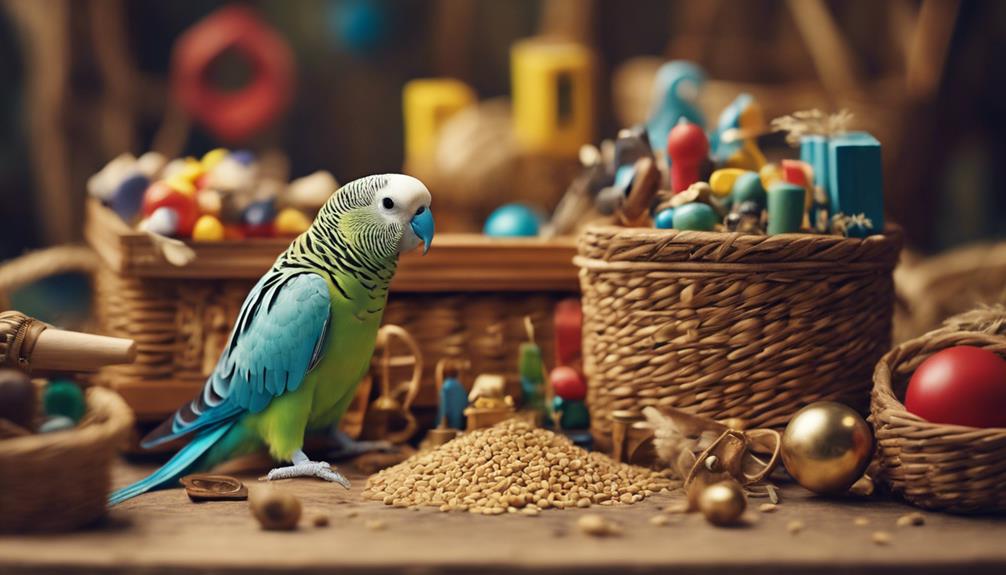As a parakeet owner, you're likely unaware that your bird has an innate need to forage, a behavior passed down through generations that's essential for their physical and mental well-being. Without foraging opportunities, your parakeet may develop behavioral issues, boredom, and stress. Foraging toys can prevent these problems by mimicking natural foraging behavior, providing mental stimulation, and encouraging physical activity. To keep your parakeet happy and healthy, you'll need to provide a variety of stimulating toys and activities. Learn how to choose the right toys and strategies to keep your feathered friend engaged and thriving – there's more to discover ahead.
Key Takeaways
- Parakeets need foraging toys to satisfy their innate foraging instinct, which is vital for their physical and mental well-being.
- Lack of foraging opportunities can lead to behavioral issues, stress, and boredom in parakeets.
- Foraging toys mimic natural foraging behavior, providing mental stimulation, physical activity, and problem-solving skills.
- A variety of foraging toys with different challenges, textures, and shapes can prevent boredom and keep parakeets engaged.
- Providing foraging toys is essential to promote a happy, healthy, and stress-free life for parakeets.
Foraging Instinct in Parakeets
When you bring a parakeet into your home, it's vital to recognize that you're not just caring for a pet, but also honoring the strong foraging instinct that has been hardwired into its DNA.
In the wild, parakeets' ancestors had to search for food to survive, and this natural behavior has been passed down through generations. As a result, your parakeet has an innate need to forage, which is necessary for its physical and mental well-being.
Foraging is an essential aspect of a parakeet's behavior, and it's crucial to provide opportunities for your pet to engage in this natural behavior. Without foraging opportunities, your parakeet may develop behavioral issues, such as feather plucking, due to boredom and lack of mental stimulation.
Benefits of Foraging Toys

By recognizing your parakeet's innate need to forage, you can take the next step in providing a fulfilling environment by incorporating foraging toys that cater to this natural behavior. These toys provide mental stimulation and prevent boredom in your parakeet, mimicking the natural foraging behavior they'd exhibit in the wild. This, in turn, encourages physical activity and problem-solving skills, keeping your feathered friend engaged and active.
Here are just a few benefits of incorporating foraging toys into your parakeet's environment:
- Prevents boredom and behavioral issues: By providing a challenge, foraging toys keep your parakeet's mind active, reducing the likelihood of boredom and associated behavioral problems.
- Encourages physical activity: Foraging toys require your parakeet to move around, climb, and manipulate objects, promoting exercise and physical activity.
- Mimics natural behavior: Foraging toys allow your parakeet to express its natural foraging instincts, providing a sense of fulfillment and satisfaction.
Choosing the Right Toys

When selecting the right foraging toys for your parakeet, you'll want to take into account a few key factors.
You'll need to contemplate how to keep your parakeet engaged and stimulated, and that means choosing toys that offer a mix of challenges and rewards.
Toy Rotation Strategies
You'll want to devise a toy rotation strategy that keeps your parakeet engaged and stimulated, as a stale toy selection can lead to boredom and behavioral problems. A well-planned rotation will guarantee your feathered friend stays curious and active.
Here are some key considerations for your toy rotation strategy:
- Rotate toys weekly to maintain bird interest and prevent boredom
- Introduce new textures, shapes, and challenges with each toy rotation
- Consider using a mix of foraging, shredding, and chewing toys for variety
Material Variety Matters
To guarantee your parakeet stays engaged and stimulated, it's important to select toys made from a variety of safe, stimulating materials that cater to their natural foraging instincts. You want to provide a diverse range of textures, shapes, and sensations to keep your parakeet's mind and beak active. Opt for toys made from natural wood, paper, and vegetable-based dyes to make sure your parakeet's safety. Avoid toys with small parts or breakable components that could pose a choking hazard.
Choose toys that offer foraging opportunities, such as puzzles or hidden compartments, to challenge your parakeet's problem-solving skills. A mix of shreddable, chewable, and interactive toys can help meet your parakeet's diverse enrichment needs.
Encouraging Natural Behavior

By providing foraging toys, you encourage your parakeet to engage in natural behaviors, such as searching for food, which are essential for its mental and physical well-being. As a bird, your parakeet has an innate instinct to forage for food, and denying it this opportunity can lead to boredom, stress, and destructive behaviors.
Here are a few ways that foraging toys can help your parakeet engage in natural behaviors:
- Mimicking natural foraging activities: Foraging toys can be filled with treats, encouraging your parakeet to search and dig, mimicking its natural foraging activities in the wild.
- Promoting physical activity: Foraging toys can be designed to require physical effort, such as lifting, pushing, or pulling, to access treats, keeping your parakeet active and engaged.
- Stimulating mental activity: Foraging toys can challenge your parakeet to problem-solve, stimulating its mental activity and reducing boredom and stress.
Preventing Boredom and Stress

Foraging toys are vital for preventing boredom and stress in your parakeet, as they provide a healthy outlet for its natural behaviors and instincts. Without these toys, your parakeet may develop behavioral issues like feather plucking due to lack of mental stimulation.
As a responsible pet owner, it's essential to provide your parakeet with engaging activities that mimic its natural behaviors in the wild. Foraging toys from reputable suppliers like Windy City Parrot offer a safe and entertaining way for your parakeet to explore, chew, and forage for treats.
By providing these toys, you'll enhance your parakeet's overall well-being and happiness. Imagine your parakeet happily digging and searching for treats, exercising its natural instincts without getting bored or stressed. Foraging toys make this possible, ensuring your feathered friend leads a happy and healthy life.
Enhancing Mental Stimulation

Providing your parakeet with a variety of foraging toys is essential for enhancing mental stimulation. It challenges them to think creatively and develop essential problem-solving skills. By introducing toys that mimic their natural foraging behaviors, you'll keep your parakeet engaged and stimulated.
This is especially important, as parakeets in the wild spend a significant amount of time foraging for food.
Some great options for foraging toys include:
- A woven vine filled with treats, encouraging your parakeet to dig and forage
- A puzzle toy that requires problem-solving skills to access the treats inside
- A foraging box filled with shredded paper and hidden treats, promoting exploration and discovery
Foraging for a Happy Bird

To keep your parakeet happy and fulfilled, you need to tap into their natural instinct to forage, which is essential for their mental and physical well-being. In the wild, birds spend a significant amount of time daily searching for food and staying alert to potential dangers. Without foraging opportunities, pet birds can become bored, develop picky eating habits, and exhibit behavioral issues.
As a responsible owner, you can provide your parakeet with a stimulating environment by introducing foraging toys. These toys offer entertainment, mental stimulation, and a rewarding activity for your pet bird.
Frequently Asked Questions
Do Birds Need Foraging Toys?
You're wondering if birds need foraging toys, and the answer is yes! Without them, birds can get bored, leading to behavioral issues. Foraging toys provide mental stimulation, physical exercise, and help prevent problems in captivity.
Do Parakeets Like to Forage?
You might be surprised to know that 80% of a parakeet's time in the wild is spent foraging! It's no wonder, then, that you'll find your parakeet will love to forage, as it's an innate behavior that keeps them engaged and stimulated.
What Toys Should Parakeets Avoid?
You should avoid giving your parakeet toys with small parts, toxic materials, sharp edges, long strings, or mirrors, as they can cause harm, injury, or stress; instead, opt for safe, stimulating toys that promote healthy exploration.
What Toys Do Parakeets Need?
As you venture into the world of parakeet parenting, you're probably wondering what toys your feathered friend can't live without. The answer is simple: foraging toys that challenge and engage, like puzzle feeders and shreddable wonders, to keep your parakeet's mind and beak busy!
Conclusion
As you provide foraging toys for your parakeet, you're not just keeping them entertained – you're unleashing their natural instincts. It's like giving them the keys to a treasure chest filled with mental and emotional riches.
By incorporating foraging toys into their environment, you're simulating the thrill of the hunt, exercising their problem-solving skills, and creating a happier, healthier bird. This not only helps alleviate boredom but also promotes natural behaviors, reducing the likelihood of stress-induced issues such as feather plucking or aggression. The benefits of foraging vs farming for food extend to mental stimulation, as foraging encourages birds to think critically and engage more actively with their surroundings, mimicking what they would experience in the wild. By gradually shifting their focus away from easy meals, you’re nurturing both their physical and mental well-being in the long run. Incorporating these activities is an excellent way to introduce variety into their daily routine, keeping them mentally sharp and physically active. Over time, the *foraging vs farming benefits* become evident, as birds develop better cognitive abilities and maintain a healthier weight due to the increased activity. Ultimately, these enrichment techniques enhance their overall quality of life, closely aligning with their natural instincts and behaviors in the wild.
So, get creative and watch your parakeet thrive in a world of foraging wonder!










